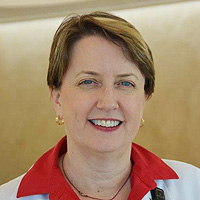Improving Our Primary Palliative Care Skills

Caroline Lloyd Doherty, DNP, AGACNP-BC, FACC
While specialist-provided palliative care is important for patients with factors like difficult-to-treat symptoms, complex grief, existential distress, and family and team conflict, clinicians should be providing primary palliative care for all patients with serious illness. Cardiologists, advanced practice providers (APPs) and nurses who have treated patients since their initial heart disease diagnoses, or who have cared for them during a hospitalization, often form strong relationships with the patients and understand their goals. Patients and families are likely to trust their cardiology team and look to them for guidance and care over the course of their heart disease. However, many of us in cardiology feel at a loss when discussing goals of care, prognosis and symptom management at the end of our patients' disease trajectories. And despite strong evidence that it can improve the quality of care for seriously ill patients, most of us have not received formal training in primary palliative care.
To that end, ACC's Geriatric Section Palliative Care Work Group is launching Palliative Care for the Cardiovascular Clinician, a new learning activity that brings together resources in a dynamic, case-based module format. Led by Course Directors Caroline Lloyd Doherty, DNP, AGACNP-BC, FACC; Jill M. Steiner, MD, MS, FACC; Richard A. Josephson, MD, MS, FACC; and Sarah J. Goodlin, MD, FACC, the course covers general principles of palliative care and advance care planning, as well as diving deeper into issues unique to patients with cardiovascular disease, such as defibrillator and ventricular assist device management, high-risk procedures like TAVR, and difficult-to-manage end-stage cardiovascular symptoms. The modules are expected to be available on ACC.org soon.
Doherty, co-chair of the Palliative Care Work Group, identified a need for primary palliative care in cardiology when she worked on the original PARTNER trial, looking at TAVR in high-risk patients with aortic stenosis. Inspired, Doherty completed a post-master's certificate in palliative care at University of Pennsylvania, where she now works as a program coordinator. Passionate about the integration of palliative care and cardiovascular disease, Doherty is determined to improve patients' access to palliative care.
"These older, frail patients were referred to our center, were looking for a cure, and were hoping we could help them," Doherty said. "If they weren't a candidate for TAVR, they wondered – what next?"
The Palliative Care Work Group is made up of cardiologists, nurses, and APPs who, like Doherty, have an interest in improving the delivery of palliative care in cardiology. Since 2015, members have published papers and posters on the subject, and hosted several workshops and webinars on topics such as advance care planning and symptom management. They also developed an Advance Care Planning Toolkit for ACC.org, as well as patient and caregiver resources for CardioSmart.
Doherty points out that the Palliative Care Work Group is committed to making this content accessible to all cardiovascular clinicians, not just ACC members. As the population ages and cardiovascular care becomes more complex, the ability to provide primary palliative care to our sickest patients becomes paramount.
"Our goal is to help cardiovascular clinicians develop their primary palliative care skills – and the confidence to use them – in order to improve patient access to these essential components of care for the seriously ill," Doherty said.
